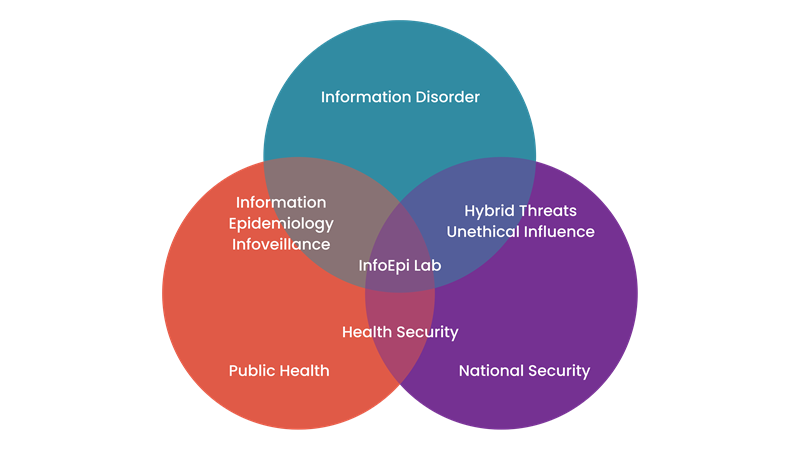Information epidemiology, often called “infodemiology,” is the study and analysis of information distribution, patterns, and determinants across electronic mediums, primarily the Internet, and within specific populations. Put simply, it’s looking at how online news spreads and affects people.
It delves into how and why information spreads while highlighting strategies to curb and counteract the spread of manipulated information. Information epidemiology is interdisciplinary, meaning it combines multiple fields. At InfoEpi Lab, our intersection is specific: public health, national security, information disorder, and countering malign influence.
Public Health: Public health is the science and practice of protecting and improving the health of entire communities by addressing preventive care, promoting healthy lifestyles, and setting health standards and regulations.
It focuses on preventing disease and injury by monitoring health issues, implementing educational programs, developing policies, and conducting research. Public health focuses on groups of people rather than a single person’s health, as with individual health (what we think of as everyday healthcare).
National Security: National Security refers to the measures and strategies a nation implements to safeguard its citizens, institutions, and sovereignty against threats. It encompasses various dimensions, including protecting a nation’s borders, territories, and interests against foreign adversaries through military might and strategic defense mechanisms. Additionally, it involves collecting, analyzing, and disseminating information regarding foreign entities that may pose threats.
Information Disorder: This term describes the spread of misinformation, disinformation, and malinformation, which can erode trust, sow confusion, and provoke violence.
Factors driving information disorder include the democratization of information creation and sharing, algorithms prioritizing sensational content, and the speed at which information travels on digital platforms. A more comprehensive breakdown of these concepts can be found here: Information Basics.
Overlapping Areas
Located at the center of this Venn diagram, the InfoEpi Lab uses insights from these fields to tackle the challenges and threats facing society today.
Information Epidemiology: This field studies the spread and impact of information, blending public health and information disorder concepts.
Infoveillance: Merging public health and information disorder, infoveillance monitors public data, especially on social media, to address public health issues.
Hybrid Threats: At the crossroads of national security and information disorder, these threats combine various tactics, often with disinformation campaigns. Hybrid influence encompasses more than this but that exists outside our purview.
Unethical Influence: This refers to efforts to manipulate people’s perceptions and actions, often to the influencer’s benefit, by denying them accurate information.
Health Security: Combining public health and national security, this field focuses on protecting populations from health threats like diseases, bioterrorism, and environmental disasters. The goal is to prevent, detect, and respond to these threats, ensuring individual and societal safety.
Citation
@article{li2023,
author = {Li, E. Rosalie},
publisher = {Information Epidemiology Lab},
title = {Information {Epidemiology} {Explained}},
journal = {InfoEpi Lab},
date = {2023-08-21},
url = {https://infoepi.org/posts/2023/08-21-infodemiology},
langid = {en}
}
